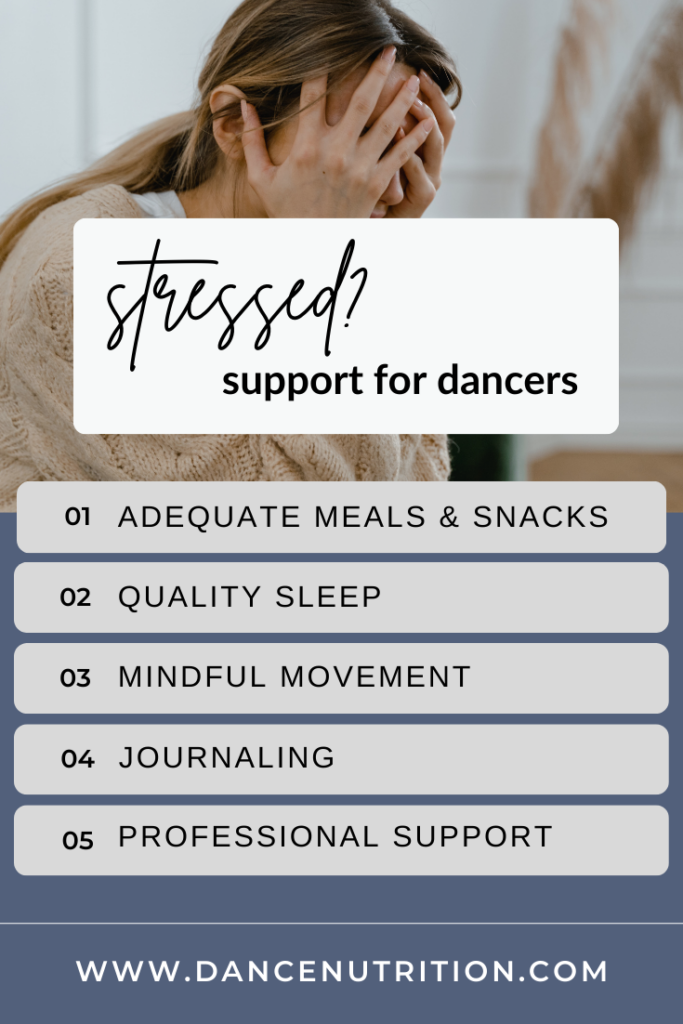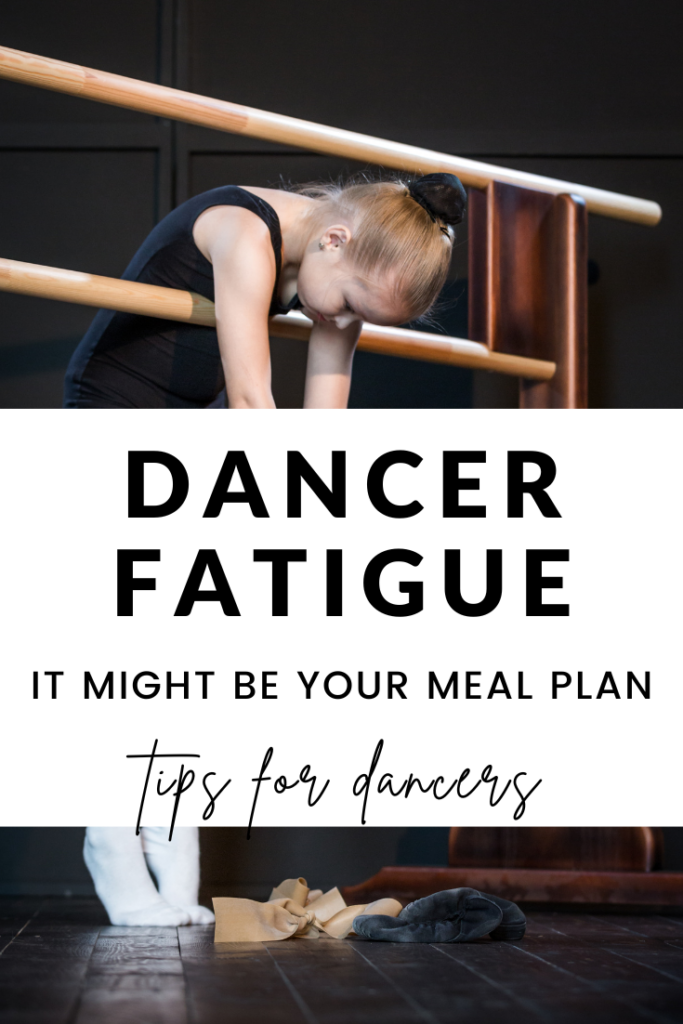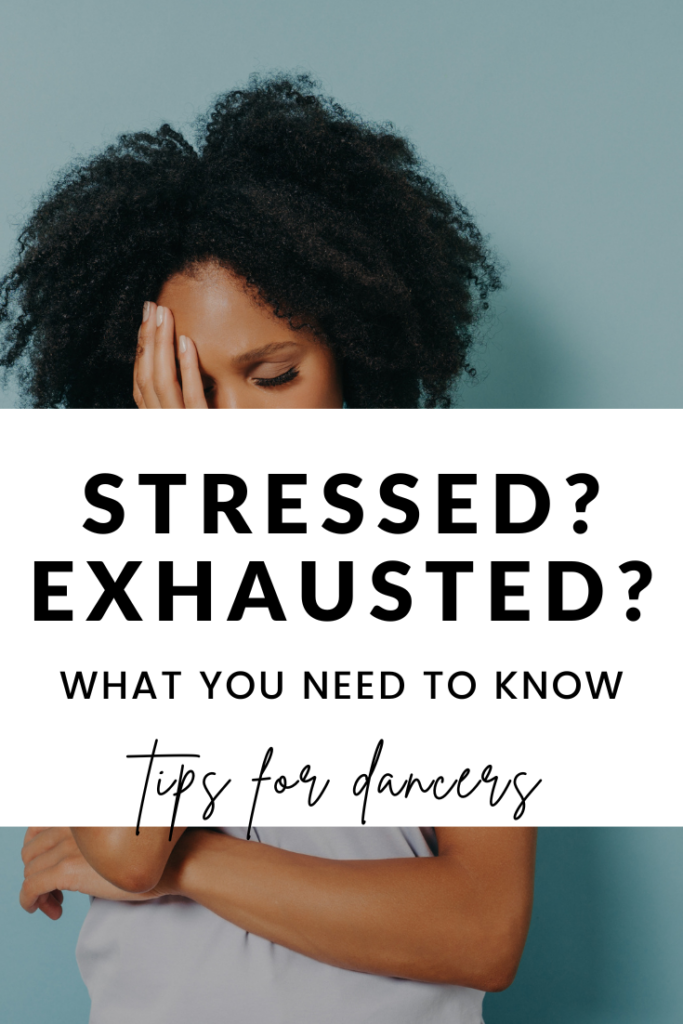It’s common for dancers to feel stressed and subsequently, fatigued. Balancing over-booked schedules with academic coursework is a dancer’s reality. Add the uncertainties of auditions and performance casting— dancers might be teetering towards overwhelm and eventually, burnout. To better handle the stress and fatigue in your life, let’s identify its roots and work towards more supportive habits.
What is stress?
In its most general form, stress involves your best’s response to a change— whether that be to your physical, mental, or emotional well-being. A stressor may be a one-time or short-term occurrence, or it can happen repeatedly. For dancers, there are two common sources of stress. The first is physical stress— an example is the trauma of a pulled muscle from overexertion. The second is mental stress— an example is the angst over an upcoming placement exam or audition. These two sources of stress are non-mutually exclusive. In other words, they can coincide: mental stress can drive a dancer’s risk of physical stress (injury).
How does stress affect a dancer?
The body is biologically wired to respond to stress and trauma in a variety of ways—in fact, the stress response is a means for survival. When acting on a perceived threat, the adrenal glands produce two key hormones: adrenaline and cortisol. Adrenaline increases your heart rate with the goal of sustaining blood flow and energy. Cortisol, which is notable for being the “stress hormone,” aids in shifting blood flow away from visceral systems like digestion and reproduction (those not needed for immediate survival) and rather, towards the brain, large muscles, and extremities.
When chronically elevated, such as with prolonged or recurring stress, high levels of cortisol are associated with digestive irregularities and menstrual dysfunction. Overexposure to cortisol also impedes your body’s immune function and might even contribute to systemic inflammation. The end result?
- Digestive irregularities such as constipation, bloat, gas, reflux, and indigestion
- Appetite dysregulation often experienced as a lack of hunger
- Poor stamina
- Irritability (a “short fuse”)
- An over-reliance on caffeine to stay alert
- Chronic sickness (due to a weakened immune system)
- Increased risk for injury
- Feelings of overwhelm and ultimately, burnout
Common stressors for dancers
While many experiences can trigger stress for a dancer, there are some that commonly come up for the dancers who approach me for nutrition coaching. If any of the biological signs mentioned above resonate with you, then you’ll want to review your routine and ask yourself:
- Am I cross-training excessively? Though it can be tempting to utilize rest days for cross-training, remember those periods of rest are just as important as your dance days.
- Is my company (or school) scheduling time for proper recovery? With every class, rehearsal, and performance, it is essential to allow muscles to rebuild from natural wear and tear. This is most difficult when evening performances are followed by early-morning classes. If possible, speak to your administration about adapting recovery time into your schedule.
- Am I eating and hydrating adequately? Eating too few meals and snacks, alongside not drinking enough, can drive feelings of fatigue. You may need to assess whether or not you’re meeting your body’s caloric needs— working alongside a dietitian is encouraged. Gentle nutrition can also be used to help optimize your food choices to support energy regulation. Here is a list of resources that can help:
Is it fatigue or overwhelm?
Feeling stressed can contribute to feelings of tiredness and fatigue. An overall lack in appetite can worsen this fatigue if you’re under-fueling. But while some degree of stress is normal for a dancer, extreme and chronic stress can lead to feelings of overwhelm— the inability to move forward in everyday activities. A few signs might include:
- Mental fog or the inability to think clearly
- Irrational thoughts and overwhelming anxieties
- Physical exhaustion
- Emotional irritability
- Feelings of helplessness
- Disproportionate reactions— overreacting to minor stressors
Seeking support when symptoms of stress and fatigue feel overwhelming is invaluable. A licensed mental health practitioner can assist in formulating tools to cope during stress— ultimately helping to alleviate the overwhelm in your life.
Might I have adrenal fatigue?
Adrenal fatigue is a term that often represents a compilation of symptoms, including:
- Unexplained fatigue
- Body aches
- Unexplained weight loss or weight gain
- Difficulty getting started for the day
- Brain fog
- Difficulty sleeping
The theory states that chronic stress could potentially lead to “overuse” of the adrenal glands, eventually resulting in their functional insufficiencies. But despite the common use of the term, adrenal fatigue isn’t a true diagnosis. In fact, research says it doesn’t exist. According to the literature and Endocrine Society, there is no sufficient research that correlates an “overuse” of the adrenal glands to fatigue. This doesn’t mean that the experiences noted above aren’t valid— it’s very possible to experience any of these symptoms. But relying on (commonly prescribed) “adrenal fatigue diets” isn’t encouraged, especially if they’re pushing a fixation around certain foods (ie. “clean” eating). Remember: disordered eating itself could be a player in any of the symptoms mentioned above.
Help! I eat when stressed
Relying on food during times of emotional distress is a behavior that some dancers struggle to navigate. The same holds true for dancers known to restrict their intake during times of stress. In both instances, under-fueling, whether a result from intentional restrictive eating or unintentional restrictive eating, can exacerbate these behaviors.
While there is nothing inherently wrong with seeking comfort from eating, it’s important to recognize this behavior as providing only temporary comfort. There are additional ways to support oneself for the long haul. A few ideas include:
Steps to reduce stress-eating
- Maintaining a healthy sleep schedule
- Eating balanced frequent meals and snacks to maintain blood sugar (this supports energy levels)
- Using meditation apps like Calm
- Journaling to help detangle your most stressful days!
- Evaluate your carb intake— Since carbohydrates are the most efficient fuel source for the body, it’s common to feel a spike in cravings for sugar. Craving foods high in carbohydrates is often a sign that you’re (1) not eating enough carb-rich foods throughout the day and (2) not getting enough sleep.
- Evaluate your social media use. Consider the accounts you follow- do they inspire you or stress you? Is that inspiration stemming from a healthy place?
- Detox from diet culture every January with The Healthy Dancer® Diet Detox
Taking a break to help dancers reduce fatigue and overwhelm
It can be tough for dancers to accept the need for a break, especially when in the depths of performance, competition, or audition season. But these symptoms might be your body’s way of communicating its need for a break. Taking a step back is encouraged— this might mean talking to your director about some time away from the studio. At the minimum, recognize the importance of a rest day (or two!) each week. These are critical to not only enable your body’s recovery but also your mind!
If this is difficult, consider time blocking. Schedule an hour of your day when you can lie on the sofa and catch up on your favorite series or book. You can also try recipe creation, journaling, or simply taking a bath. If you’re feeling anxious about the idea of time off, then read this article.
The article was written alongside the help of student Abby Haynes. Expert written and reviewed by Rachel Fine.





